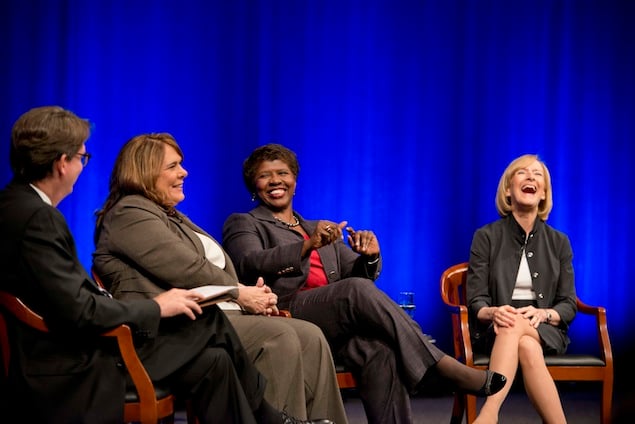Around an hour into the second presidential debate, moderator
Candy Crowley of CNN had a defining moment on her hands. Former governor Mitt Romney was staring
down President Barack Obama, who sat on a stool behind him, accusing him of reacting
too slowly to the attack in Libya that killed the American ambassador.
“I want to make sure we get that for the record,” Romney said. “Because it took the
President 14 days before he called the attack in Benghazi an act of terror.”
Crowley knew the facts, and on this specific point, Romney was wrong. But she also
understood the larger point he was trying to make. So how best to get both points
across fairly in front of the eyes of a nation?
“He did in fact, sir. He did call it an act of terror,” Crowley said to Romney. “It
did, as well, take two weeks or so for the whole idea of there being a riot out there
about this tape to come out. You’re correct about that.”
Some of what she said, Crowley admitted at a panel discussion last night with fellow
news anchors
Gwen Ifill and
Judy Woodruff of
PBS NewsHour, was obscured by the town hall’s applause for both parts of her interjection. But
the point remains the same. She cut into the debate to set the record straight, and
to steer the conversation back to something more useful for everyone watching.
The event, titled “Campaign 2012 Coverage: Breaking New Ground,” was hosted by the
Newseum and the Bipartisan Policy Center to discuss the challenges for television
journalists in covering elections. Crowley, in moderating last week’s presidential
debate, was the first woman to do so in 20 years. Ifill famously moderated the vice
presidential debate between Joe Biden and Sarah Palin in 2008, and with Woodruff became
the first all-female team to anchor a network’s coverage of the Republican and Democratic
conventions for PBS this year.
Ifill believes conversation—about issues such as foreign policy, the economy, and
what candidates say versus what they do—truly drives the opinions of voters. Advertisements
might be more influential in swing states, she said, simply because those states are
inundated with them, but the debates add to what is important in the eyes of the average
American and help move election season along.
Crowley added, “They wouldn’t be doing this if it weren’t still effective.”
Preparing for the debate was “the hardest thing I’ve ever done,” Ifill said. She hosted
both the 2004 and 2008 election vice presidential debates and said she would lock
herself in her room with hundreds of flash cards with various facts and figures. She
read all the candidates’ books, speeches, and anything else she could get her hands
on.
“I felt like I was pregnant for six weeks,” Crowley said as she told the audience
about how nervous and nauseated she felt every time she thought about the debate to
come. Later, she said, “I need to know 100 percent of stuff. I’ll probably use 1 percent
of that, but I don’t know which 1 percent.”
Knowing the information and which issues are most important to the audience are two
things moderators need to be able to direct the debate. But all three agreed that
something else was much more paramount: listening. In moderating, in politics, and
in life in general, the panelists said, listening is a key that will open plenty of
doors.
“To me, there’s nothing more important than listening,” Crowley said. “If you’re not
listening to the answer, you’re not having a conversation.”
















